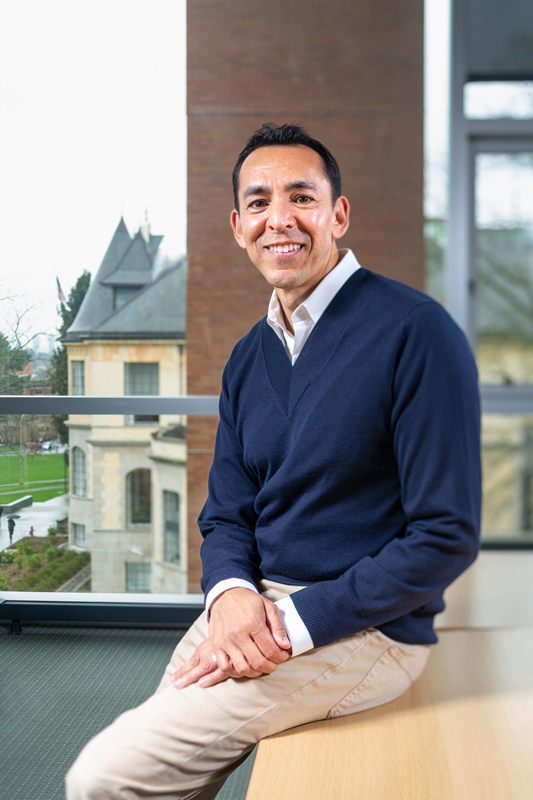Company Man: Yusuf Mehdi has made a career of Microsoft’s “amazing playground” of technologies
Yusuf Mehdi (MBA 1992) likes to joke that he’s the “Forrest Gump of Microsoft.”
But unlike the cinematic everyman who bumbles into monumental events in modern American history, Mehdi, the corporate vice president leading the Windows and Devices Group, has driven many of the great moments in Microsoft.
In his 26 years with the Redmond-based tech giant, Mehdi has been central to the development and launch of Internet Explorer, Bing search engine, Microsoft Advertising platform, MSN.com, Windows 10, Xbox One, Surface and HoloLens—a wide swath of the Microsoft portfolio. And his career has spanned three very different CEOs in the innovative Bill Gates, the enterprising Steve Ballmer, and the empathetic Satya Nadella.
“Each has run Microsoft in a different way, but I think it was the right way at the time,” he says. “What hasn’t changed is the desire to make a difference, to create technology that has a positive impact on the world.”
Into technology
That Mehdi went into technology was a bit of a lark. The son of a Mexican mother and Indian father graduated from Princeton with a degree in economics and landed a job at Reuters just as the global information firm was introducing its groundbreaking automated electronic trading system.
“You’re from college,” he recalls his new boss saying. “You must know about these things called computers. Why don’t you figure out what they can do?”
What they could do, he demonstrated, was make loads of money. Traders bought the revolutionary digital systems like hotcakes. And soon Mehdi was offered a tempting opportunity to run a Reuters business in Argentina. Feeling a bit underprepared, he decided to earn his MBA at Foster first.
A fateful internship at Microsoft turned into a job, and that job turned into a career. “I couldn’t imagine being anywhere more than two or three years, let alone 25,” he says.
But he loved the people and the opportunity to play in Microsoft’s “amazing playground” of technology and innovation.
Internet dreams
Mehdi’s initial job was marketing Windows 3.1. But that was really a jumping off point. “I’ve always been lucky to identify with people at Microsoft who are at the forefront of change,” he says.
Those visionaries might say the same thing about Mehdi. Being an early champion of Microsoft’s move to the Internet earned him key roles in Internet Explorer 1.0 to 5.0 and the commission to explore every commercial possibility of the online world, resulting in Bing, Microsoft Advertising and MSN, which became one of the most popular sites on the World Wide Web.
 Mehdi went on to lead the rollout of Xbox One, the gaming and 4K entertainment console platform, and oversee development of blockbuster games like Halo and Minecraft. His teams have rejuvenated the Windows operating system, refined the category-creating Surface Pro tablet, created the smart assistant Cortana, and realized the sci-fi promise of mixed reality through HoloLens, the first fully untethered holographic computer that turns the world into a computer screen.
Mehdi went on to lead the rollout of Xbox One, the gaming and 4K entertainment console platform, and oversee development of blockbuster games like Halo and Minecraft. His teams have rejuvenated the Windows operating system, refined the category-creating Surface Pro tablet, created the smart assistant Cortana, and realized the sci-fi promise of mixed reality through HoloLens, the first fully untethered holographic computer that turns the world into a computer screen.
Under Mehdi’s leadership, the Windows and Devices Group, the largest reporting segment in Microsoft, generated nearly $40 billion in revenue and $8+ billion in operating profit last year.
Finding time
Today, a rejuvenated Microsoft offers a broad portfolio of products addressing the range of customer needs at work and in everyday living. But the demands of a high-tech existence have taken a toll.
So Mehdi has been entrusted to lead a new initiative that will summon all of Microsoft’s products and innovations to solve one of the great pandemics of modern life: the lack of time.
A true believer in Microsoft’s mission of empowering people and organizations to achieve more, Mehdi is “all in” on discovering the tech-driven solution to lost time. And he admits to wishing he had more of it in front of him.
“When I started my career, there were no cell phones, no Internet, no digital music, no social media,” he says. “What will the next 25 years look like? What new technologies will make today’s look quaint by comparison?”
Count on Mehdi to stay a while, and have some say in the matter.

